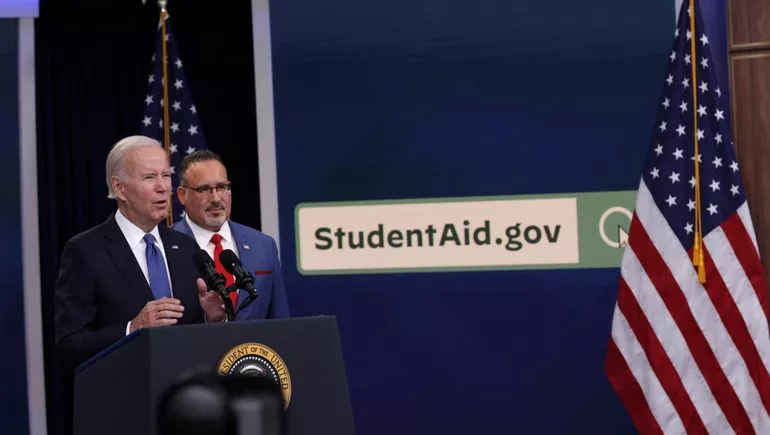[ad_1]
Dive Quick:
- An auditor for the U.S. Division of Instruction declined this week to give an view on the agency’s fiscal 2022 funds, boosting concerns with how the Biden administration calculated its college student financial loan debt forgiveness program past calendar year.
- KPMG in a report said Schooling Section officers did not “provide adequate evidential matter to aid specified key assumptions” relevant to the charge of the personal debt cancellation prepare, which is stalled in courtroom. The approach calls for wiping away up to $20,000 in financial debt for debtors earning up to $125,000 a yr.
- The Education Division partly concurred with KPMG’s results but managed that it figured out the program’s value and how numerous individuals would get edge of it utilizing “relevant exploration literature” and consider-up prices from other federal added benefits programs.
Dive Insight:
Concerns have swirled about the price tag of President Joe Biden’s prepare to wipe absent mass chunks of student mortgage financial debt, which court rulings temporarily halted. The U.S. Supreme Courtroom will listen to oral arguments in lawsuits towards the plan Feb. 28.
Some estimates recommend it could expense the federal governing administration hundreds of billions of dollars around the next ten years. The Education and learning Office approximated prices will be $379 billion in excess of 30 many years, although the nonpartisan Congressional Budget Workplace projected $400 billion in excess of that timeframe.
The forgiveness application appears to be to have so severely thrown the Training Department’s funds into issue that for the initial time in at the very least 20 many years the agency did not receive a clean audit.
KPMG took individual problem with the Education Department’s modeling of how many men and women would participate in the personal debt cancellation system. Auditors wrote the department’s processes “were not thoroughly built at an ideal amount of precision” to validate details used to gauge the consider-up rate, and hence the cost, of the method.
“As a final result, the documentation more than the subsidy price tag estimates in the financial statements was not supportive to proof the estimate calculations,” they wrote.
Officers at the Education and learning Office and U.S. Business of Management and Spending budget reviewed and accepted the cost estimates, according to the report. The Education Section gave a reaction posted in the auditor’s report declaring it made these procedures accurately. But it did “acknowledge that controls may have not operated as intended owing to absence of strictly comparable other federal benefit plans.”
It reported it would choose KPMG’s feed-back and increase how it calculates bank loan fees.
An Education Department spokesperson claimed Thursday that officials primarily based estimates for the personal loan method on details accessible to them at the time. The section is not accepting programs for credit card debt aid and for that reason “has not been capable to use concrete application knowledge to reveal the precision of its approximated get-up amount,” the spokesperson stated.
The spokesperson explained the division officials “look ahead to prevailing” in the Supreme Courtroom so it can let suitable debtors to apply for aid and in transform give auditors the exact choose-up quantities.
Soon after the auditor’s report commenced circulating, Rep. Virginia Foxx, a North Carolina Republican and chair of the Property Education and learning and the Workforce Committee, began blasting the Education and learning Department.
She accused officers of “blatantly lying.” KPMG did not say in its report that the department misrepresented its finances.
“This auditor explained it would not touch the Department’s shoddy guesses with a 10-foot pole enable alone signal off on them,” Foxx claimed in a assertion. “This is unquestionably preposterous.”
[ad_2]
Source backlink
Meet Our Successful Graduates: Learn how our courses have propelled graduates into rewarding
careers. Explore their success stories here!
Discover More About Your Future: Interested in advancing your teaching career? Explore our
IPGCE, MA, and QTS courses today!

Explore Our Courses: Ready to take the next
step in your education journey? View our
comprehensive course offerings now!

